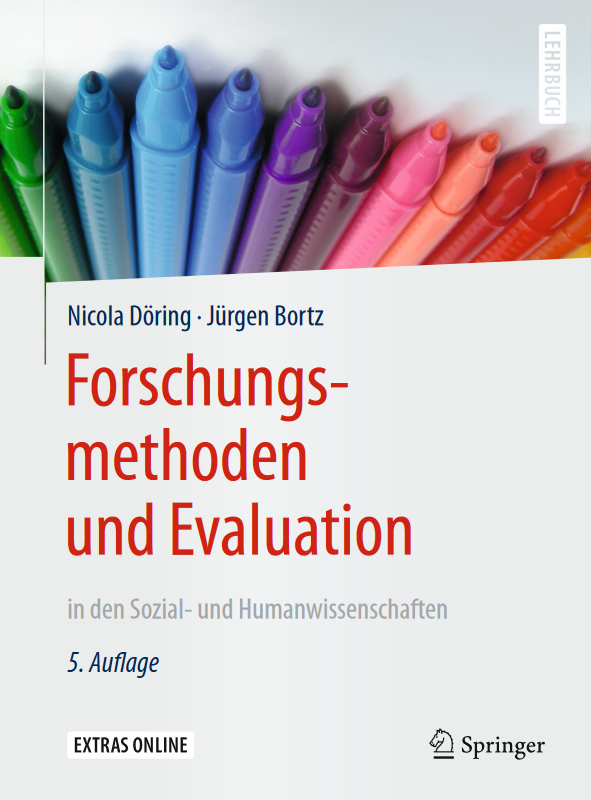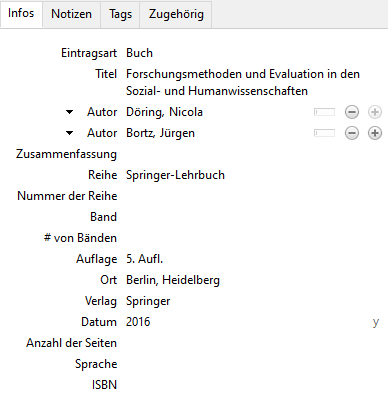Academic publication types
Citation style used: APA 7th Edition
A | B | C | D | E | F | G | H | I | J | K | L | M | N | O | P | Q | R | S | T | U | V | W | X | Y | Z | ALL
M |
|---|
MonographMonographs are books that have been written jointly by all of the listed authors. A monograph focuses on a topic and, generally speaking, addresses this in a comprehensive and conclusive manner. You are thus able to gain an overview and deepen your knowledge on a broad basis. ZHAW swisscovery, for example, is suitable for searching for academic books (monographs, collective works, etc.).
Döring, N., & Bortz, J. (2016). Forschungsmethoden und Evaluation in den Sozial- und Humanwissenschaften (5. Aufl.). Springer. https://doi.org/10.1007/978-3-642-41089-5
Publication genres in the form of monographs (list not exhaustive): textbooks, handbooks, practical guides, essays, legal commentaries | |
N |
|---|
Narrative review | |
P |
|---|
Practical guidePractical guides translate research results into recommendations that can be implemented in practice.
Bosley, I., & Kasten, E. (2020). Emotionale Intelligenz bei Kindern fördern: Ein Elternratgeber mit interaktiven Geschichten, Übungen und Spielen. Springer. https://doi.org/10.1007/978-3-658-28561-6
FPublication form: monograph | |
Preprint and postprintThe SHERPA/RoMEO database makes the following distinction: preprints are all versions of an article that were written prior to the peer review, while postprints are all versions after the peer review process has been completed. Preprint and postprint versions of published articles can also be found in the ZHAW digitalcollection, the repository of the ZHAW. Submitted version, preprint:
Ehrensberger-Dow, M. (2018). Chapter 5.2 process research. ZHAW digitalcollection. https://doi.org/10.21256/zhaw-4687
Räber, M., Heinzelmann, A., & Oliapuram, J. (2019). Analysis of a three-phase AC chopper with high power factor for the use in “PV-to-Heat” applications. ZHAW digitalcollection. https://doi.org/10.21256/zhaw-18668 Röcker, B., Rüegg, N., Glöss, A. N., Yeretzian, C., & Yildirim, S. (2017). Inactivation of palladium-based oxygen scavenger system by volatile sulphur compounds present in the headspace of packaged food. ZHAW digitalcollection. https://doi.org/10.21256/zhaw-4261 Accepted version, author accepted manuscript, postprint (not in published layout):
Nicoletti, C., & Läubli, T. (2018). Leg and back muscle activity, heart rate, performance and comfort during sitting, standing, and using a sit-stand-support with different seat angles. ZHAW digitalcollection. https://doi.org/10.21256/ZHAW-17602
Wildi, M., & Bundi, N. A. (2019). Bitcoin and market-(in)efficiency: A systematic time series approach. ZHAW digitalcollection. https://doi.org/10.21256/zhaw-19440 In accordance with the APA 7th edition, the repository where the text was found is stated rather than the publication in which an article or contribution appeared when citing preprint and postprint versions. Source: What are the differences between preprint and postprint versions? (2017). ZB MED - Publication Portal for Life Sciences. https://www.publisso.de/en/advice/publishing-advice-faqs/preprint-and-postprint/ | |
Primary researchPrimary research is empirical, methodological, hermeneutical, historical or theoretical consideration of a particular research question or hypothesis.
Eid, R., Elbeltagi, I., & Zairi, M. (2006). Making Business-to-Business International Internet Marketing Effective: A Study of Critical Factors Using a Case-Study Approach. Journal of International Marketing, 14(4), 87–109.
https://doi.org/10.1509/jimk.14.4.87
Kalhoff, H., Schmidt, I. V., Heindl, I., Kunert, J., & Kersting, M. (2021). Feeding frozen complementary foods promotes food acceptance in infants: The randomized intervention trial Baby Gourmet. Nutrition Research, 87, 49–56. https://doi.org/10.1016/j.nutres.2020.12.020 Publication form: journal article | |
Proceedings | |
R |
|---|
Research reportResearch reports describe the current status or results of a research project, joint projects or the research activities of an entire organisation. They are prepared by research institutions at universities or companies and are commissioned by government agencies, international organisations, research funding institutions and businesses. They are primarily published in repositories and on websites.
Eisner, M., Ribeaud, D., & Locher, R. (2009). Prävention von Jugendgewalt: Forschungsbericht zuhanden des Bundesamtes für Sozialversicherungen (Expertenbericht Nr. 05/09; Beiträge zur sozialen Sicherheit). Bundesamt für Sozialversicherungen.
https://doi.org/10.5167/uzh-166394
Leuenberger, T., Glaser, M., Christensen, L., & Birrer, A. (2018). Sozialwissenschaftliche Begleitstudie zur Solaren Fitness- und Wellnessunit (SFW) im NEST an der Empa Dübendorf. Bundesamt für Energie. https://www.aramis.admin.ch/Default?DocumentID=50000&Load=true
Pethes, N. (2003). Literatur- und Wissenschaftsgeschichte. Ein Forschungsbericht. Internationales Archiv für Sozialgeschichte der deutschen Literatur (IASL), 28(1), 181–231. https://doi.org/10.1515/IASL.2003.1.181
| |
Review, research synthesisReviews summarise findings from several comparable primary research studies. There are various kinds of reviews that differ in terms of the methodology applied.
Pieper, D., Ober, P., Dressler, C., Schmidt, S., Mathes, T., & Becker, M. (2019). Effizientere Leitlinienerstellung – eine narrative Übersichtsarbeit. Zeitschrift für Evidenz, Fortbildung und Qualität im Gesundheitswesen, 146, 1–6.
https://doi.org/10.1016/j.zefq.2019.08.004
Systematic reviews aim to incorporate all relevant literature on a subject. The methodological approach is disclosed transparently (where exactly what was searched for and which selection and evaluation criteria were applied).
Jungjohann, J., Gegenfurtner, A., & Gebhardt, M. (2018). Systematisches Review von Lernverlaufsmessung im Bereich der frühen Leseflüssigkeit. Empirische Sonderpädagogik, 10(1), 100–118. https://doi.org/10.25656/01:15963
Meta-analyses evaluate the results of primary research studies using statistical methods in order to derive greater explanatory power from the results. To make this possible, all relevant literature must first be searched for as well. The process is also presented here in a transparent and comprehensible manner.
Schudey, A. P., Jensen, O., & Kraiczy, N. D. (2016). "Made in?" – Eine Metaanalyse multidimensionaler Country-of-Origin Effekte. Schmalenbachs Zeitschrift für betriebswirtschaftliche Forschung, 68(1), 47–74. https://doi.org/10.1007/s41471-016-0002-0
Publication form: journal article Source: Ressing, M., Blettner, M., & Klug, S. J. (2009). Systematische Übersichtsarbeiten und Metaanalysen. Deutsches Aerzteblatt, 106(27), 456–463. https://doi.org/10.3238/arztebl.2009.0456 | |
S |
|---|
Systematic review | |
T |
|---|
TextbookTextbooks provide a summary of the current state of knowledge on a scientific sub-field for study purposes and are didactically appropriate.
Degen, H. & Lorenscheid, P. (2012). Statistik-Lehrbuch: Methoden der Statistik im wirtschaftswissenschaftlichen Bachelor-Studium (4. korr. Aufl). Oldenbourg. https://doi.org/10.1524/9783486715880
Publication form: monograph | |

